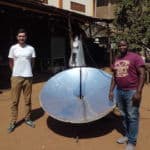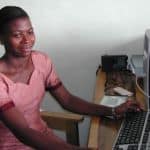Find Good Partners and Don’t Quit: Lessons from a Water-Ag Innovator
Social entrepreneurs generally have their minds set on one very important goal when they start their business: They want to create impact. But one thing we don’t all necessarily think about is how long it takes.
For us at Si Technologies, impact has meant protecting farmers around the world and their crops against increasingly common droughts that devastate local communities. While it’s taken us a number of years to get where we are, and we have far to go, we’re here to tell other social entrepreneurs: Change is a long haul, but don’t give up.
Our story begins in the 1990s when scientists began researching the positive effects of silicon on plant life. Up until then, the general research community believed silicon was an inert mineral that played no important role in human and plant life. Slowly, science began suggesting that silicon does indeed play a key role in metabolic processes, and not just in humans, but in plants as well.
With that knowledge, we started a company called Si Technologies to develop NewSil, a silicic acid/boron spray. When applied to plants, the spray enables them to begin rapidly increasing their silicon intake and, in turn, increase how efficiently the plant uses water. On top of that, although the silicic spray is not a pesticide, it also prevents damage from pests because the silicon intake creates an opal layer just below the skin, making it that much harder for fungi, bacteria and animals to penetrate the outer layers. Tests show that NewSil increases crop yields between 5 and 35 percent, as well as the overall quality of the crop.
Now, 1 billion people don’t have enough food to eat. With a potential solution to this seemingly insurmountable challenge in our pocket, we wanted to get our product quickly into the hands of millions of subsistence farmers around the world who were experiencing drought, crop loss and, as a result, poverty.
When I started our business, no one told us it would take almost two and a half years to get the stamp we needed just to legally sell our water-saving technology in one country, let alone many. In India, for instance, we had the opportunity to leapfrog the process by making large donations to certain leaders, but we declined. That’s just not how we do business. After finally receiving product registration in India, it took another two years of paperwork in South Africa and Indonesia to register our products there.
Product registration became a delicate balancing act. How can we continue to grow our startup, reach farmers in need, navigate these processes in multiple countries, and still stay afloat? The time it takes can seriously impede a small social enterprise like ours when there aren’t other revenue streams to finance new projects, as it can easily cost between $50,000 to $100,000 just to do the testing required to receive registrations and pay associated legal fees.
For us, good partners have been one of the most important parts of our continual success, and Securing Water for Food: A Grand Challenge for Development (SWFF) has definitely been one of those partners. SWFF helps fund and accelerate tech-based solutions like Si Technologies that allow more food to be produced with less water. In 2015, we received $500,000 in SWFF funding, and this access to capital has helped alleviate the pressures we faced associated with growth and helped us gain credibility. Now Si is part of the SWFF network of 28 innovators operating in 30-plus countries that have produced more than 3,000 tons of food, saving more than 2 billion liters of water and serving more than 1 million farmers.
In this space, we’ve learned that it’s critical to find investors, employees and partners who understand not only how to increase the bottom line, but how to assess and scale an innovation’s social, economic and development potential to millions of people.
Right now, we’re focused on building revenue in our current markets and testing a new patented powder form of NewSil that will significantly reduce shipping costs and increase shelf-life, while expanding into new markets, including Mozambique, Kenya and China. It may not be a fast-moving process, but the growing food security challenges our world faces keep us focused on water-saving solutions.
Bart A.J. de Jonge is the CEO of Si Technologies.
Photo courtesy of Si Technologies.
- Categories
- Agriculture



